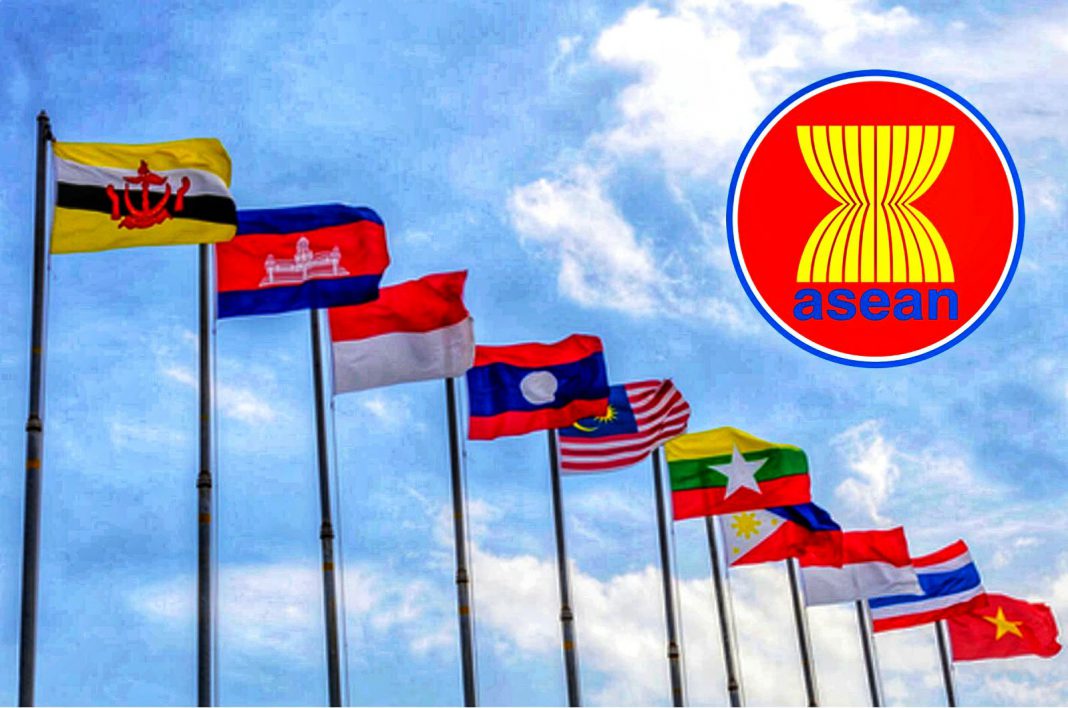The flags of the 10-member countries of the Association of Southeast Asian Nations (ASEAN) – Brunei Darussalam, Cambodia, Indonesia, Laos, Malaysia, Myanmar, Philippines, Singapore, Thailand, and Vietnam
Image: https://www.shutterstock.com/
By Alithea De Jesus
Finance Secretary Carlos Dominguez III has called on the member-states of the Association of Southeast Asian Nations (ASEAN) to adopt a six-point plan of action geared to strengthen the regional bloc’s financial resilience against future economic shocks and expand growth and employment opportunities in the emerging digital economy.
This strategy, which calls for a recalibration of ASEAN’s work plans, will enable the region to be more responsive to the new challenges posed by the COVID-19 pandemic, Secretary Dominguez said.
He also called on ASEAN members to enhance their cooperation on the research and development (R&D), production and distribution of COVID-19 vaccines to ensure the accessibility of developing countries to these treatments.
During the 24th ASEAN Finance Ministers’ Meeting (AFMM) held last week via teleconference, Secretary Dominguez said his proposed six-point plan of action involves mobilizing more support for infrastructure investments in the region; expanding ASEAN’s capacity for disaster risk financing initiatives, and ensuring open trade within ASEAN during global emergencies.
“The free flow of goods within the region requires harmonizing our tariff and customs clearance policies. We also need to further harness technology to expand the access of our enterprises to regional and global supply chains,” Secretary Dominguez said during the AFMM.
He said ensuring quick access to disaster risk financing, on the other hand, will help shield the region from future economic shocks.
Infrastructure has been proven to have the largest multiplier effect on the economy, which is why the Philippines has made investments in this sector the center of its economic recovery program, Secretary Dominguez said.
He said his proposed plan of action also includes intensifying regional cooperation in preventing tax leakages in cross-border financial transactions, and developing appropriate financial instruments to help member-countries raise funds for health infrastructure and supplement fiscal requirements in times of emergencies.
Completing this six-point strategy is the need for ASEAN to step up its information exchange on innovative technologies and expand the digital economy to boost growth and create more employment opportunities for its peoples, he said.
“Our collective efforts on these proposed actions will enhance each country’s fiscal position to withstand future crises and bolster our economic resilience,” Secretary Dominguez said.
During the 6th ASEAN Finance Ministers’ and Central Bank Governors’ Meeting (AFMGM) also held last week, Secretary Dominguez urged ASEAN to closely cooperate on ensuring the access of developing economies to COVID-19 vaccines and treatments.
“The wild card in all our planning and strategizing is the virus itself. We have no knock-out punch until a safe and effective vaccine is ready for mass distribution. I, therefore, encourage the ASEAN member-states to significantly enhance cooperation in the area of COVID-19 vaccine research, development, production, and distribution,” Secretary Dominguez said.
“The ASEAN should help ensure the accessibility of developing countries to these treatments,” he added.
Secretary Dominguez also reiterated his call for ASEAN to “recalibrate and strengthen financial cooperation” among member-countries, as the COVID-19 pandemic that has brought the global economy to its knees would not be the last.
“We must brace ourselves for future outbreaks. Our policies must be targeted towards enhancing each country’s fiscal position to withstand future shocks and bolster our economic resilience,” he said.
Secretary Dominguez expressed optimism over the ASEAN’s capability to quickly recover from the pandemic.
“With greater solidarity and stronger collaboration, I am confident that we can quickly return to the path of inclusive growth and shared prosperity. Together, we will beat this pandemic,” he said during the AFMGM.
Secretary Dominguez said that with no certainty as to when the pandemic will end, economies are now facing a test of fiscal stamina that would determine how quickly they can bounce back from this global crisis.
“The public health effort will be a marathon, not a sprint. If this turns out to be a very long battle, we should have all the fiscal tools to outlast the enemy,” he said during the AFMGM.
Secretary Dominguez said that as a result of President Rodrigo Duterte’s game-changing reforms passed by the Congress over the last four years, the Philippines was financially ready when the pandemic struck this year.
“We have been consistent with our approach. We choose to take the path of fiscal prudence in handling this crisis,” Secretary Dominguez said.
For the Philippines’ economic stimulus package, he said the Congress adhered to President Duterte’s policy by passing fiscally responsible measures that will allow the country “to meet the challenge of economic recovery without imposing a heavy burden on future generations.”
“At this time, we are doing our utmost to balance our efforts of reviving consumer confidence and reopening the economy with health interventions,” he said.
Vietnam, represented by Finance Minister Dinh Tien Dung, is the host of this year’s annual meetings of ASEAN’s finance ministers and central bank governors. The meetings were held online amid the mobility restrictions resulting from the COVID-19 pandemic.
The 24th AFMM tackled the finance track priorities of ASEAN, which focused on enhancing financial connectivity, integration, stability and inclusion in the region.
The Meeting also discussed regional economic developments, the progress of the ASEAN financial cooperation and other related initiatives.
For the 6th AFMGM, the finance ministers and central bank governors discussed the progress of ASEAN financial cooperation, the developments on the ASEAN Economic Community (AEC) Blueprint, and ASEAN’s Roadmap for Monetary and Financial Integration (RIA-Fin).














